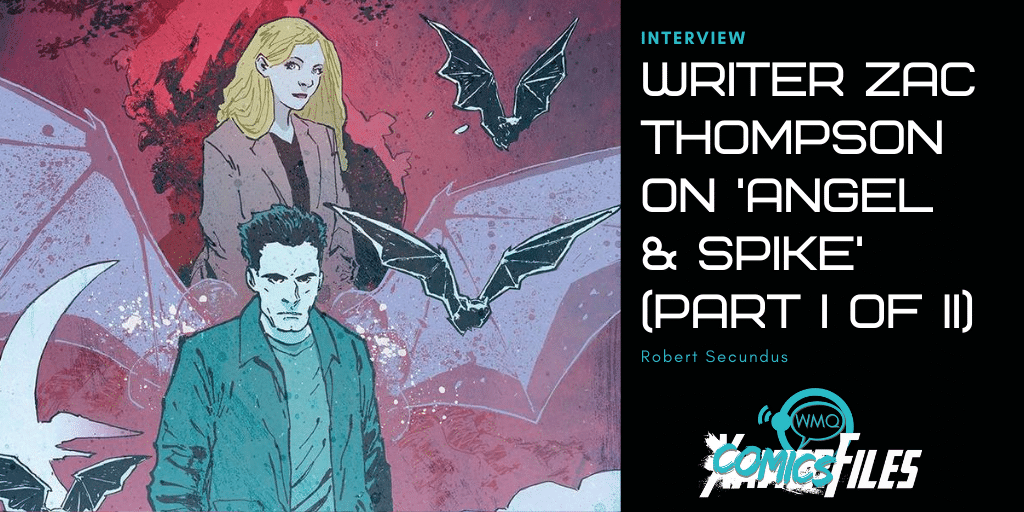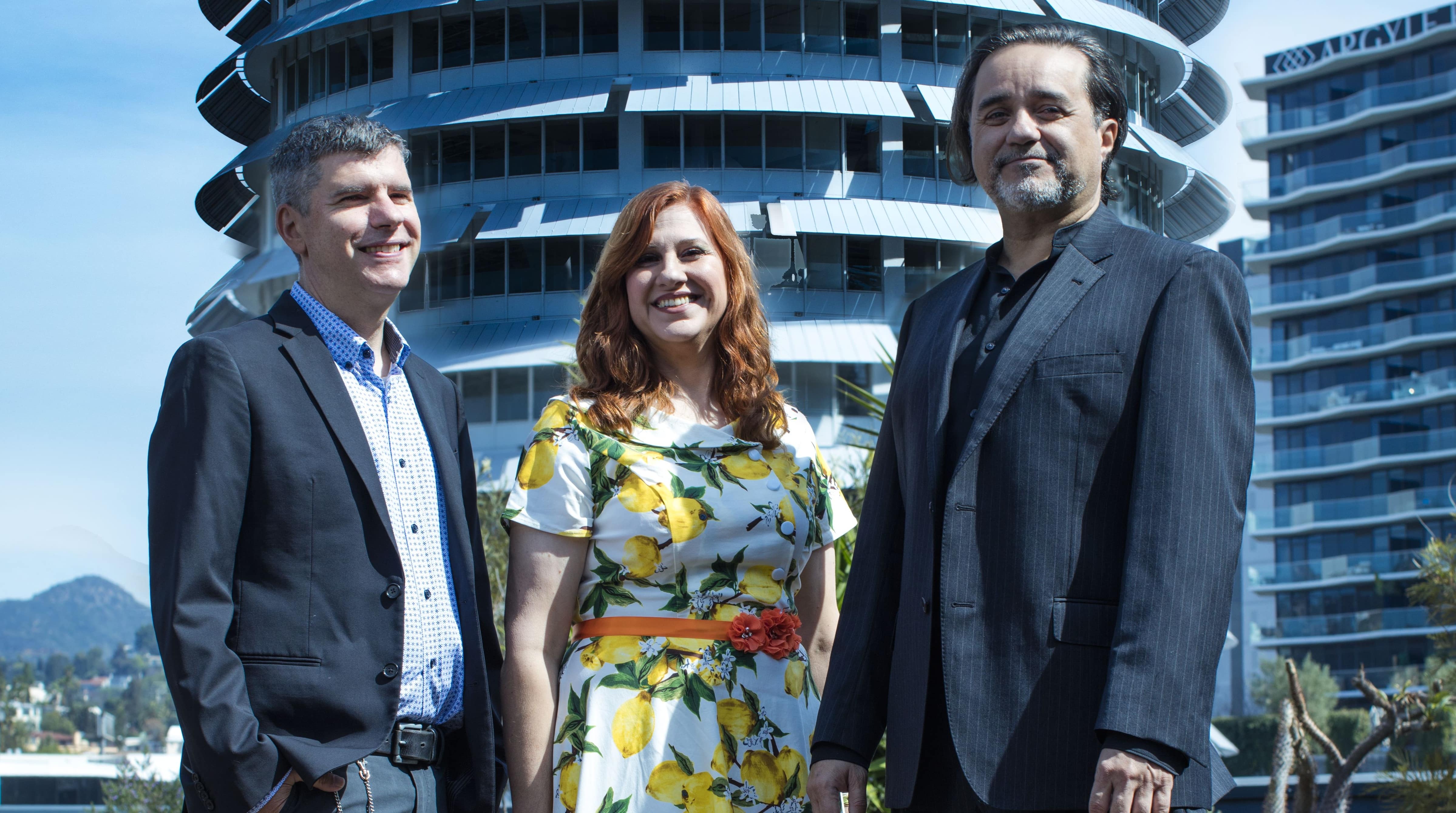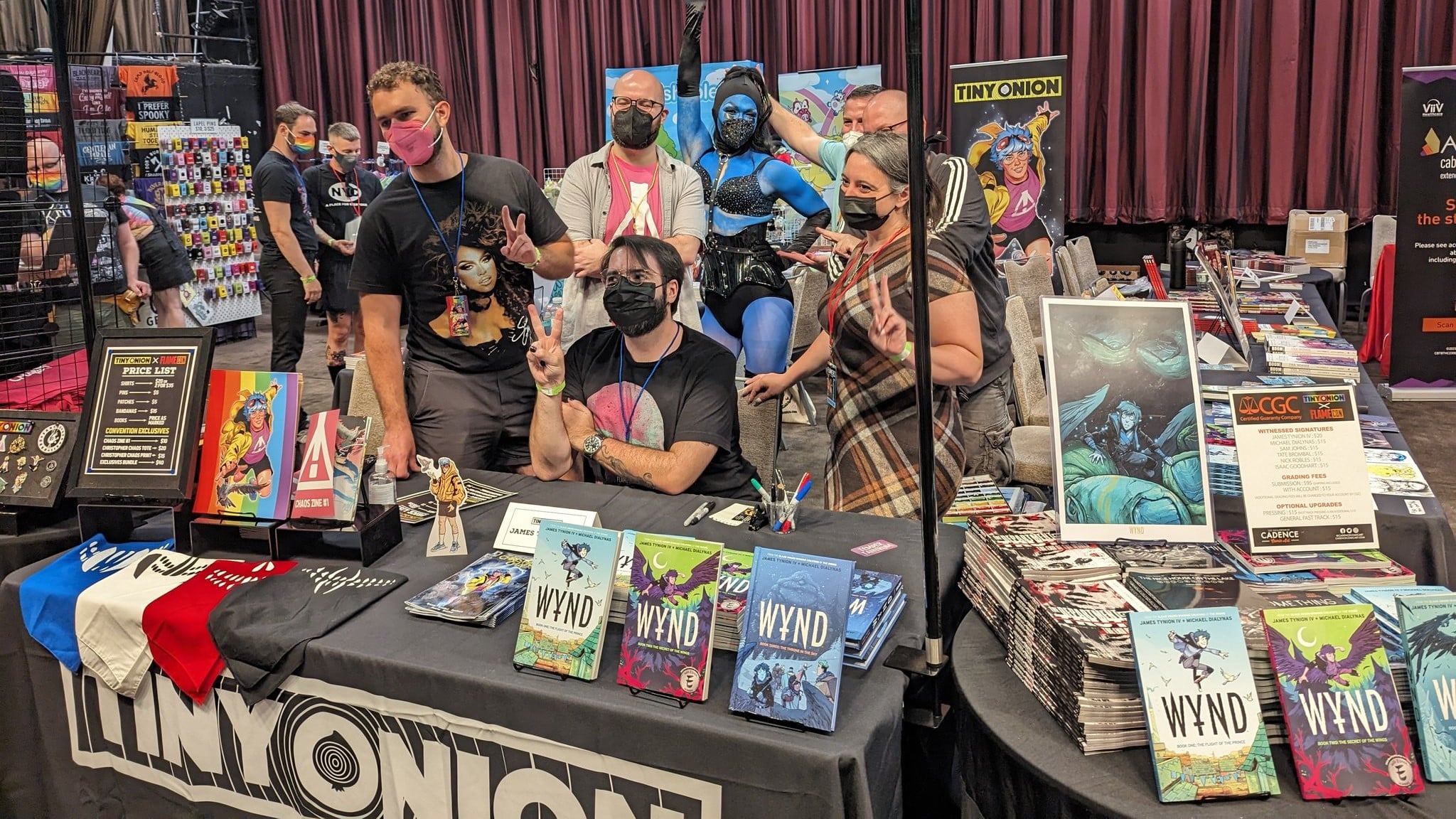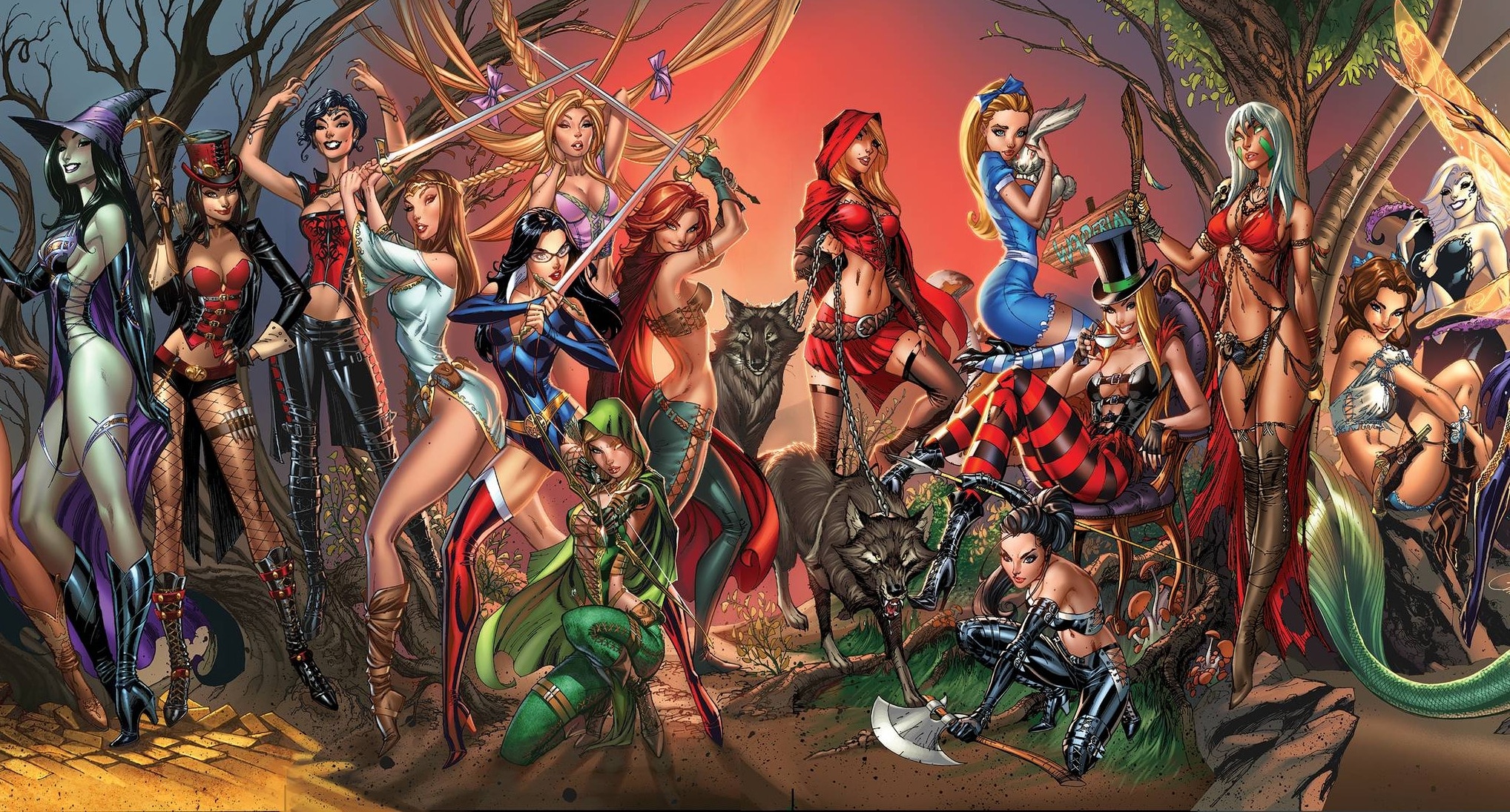Bryan Edward Hill and Gleb Melnikov revitalized and reimagined Angel for a new age in Angel & Spike. This September, Zac Thompson and Hayden Sherman are continuing that reimagination, starting Sept. 23 in Angel & Spike #14, and hoping to create stories in the BOOM!-fyverse that both capture the magic of the original series and critically reevaluate the source material.
This interview took place on July 30. It has been edited for length and clarity. Content Warning: Contains a discussion of suicide and suicidal ideation in fiction as well as representations of sexual violence.
RS: Joining me today is Zac Thompson, writer of one of my favorite graphic novels of all time, The Replacer. Zac is also currently writing with Emily Horn the excellent solarpunk far-future comic No One’s Rose, and with Lonnie Nadler, the neo-noir meta-Western comic, Undone by Blood, or the Shadow of a Wanted Man, among many, many other excellent comics, including Angel & Spike beginning with issue #14 this September.
Before we began the interview, Zac, I asked you to pick an episode of Angel for us to talk about. Since I assume you can’t go into too many details about your comic, given, you know, spoilers, I thought a discussion about a particular episode would be a good way to help Angel fans get to know you both as an Angel writer and a fan. But before we dive into that, I have a few intro/general questions to toss your way. So, first of all, could you just describe your history with Buffy and Angel?
ZT: I came into Buffy and Angel late, like after they had already aired on television. I was a child of the DVD boom. So as the seasons were getting released, I was snatching them up and basically consuming them as fast as I possibly could. I was that guy who carried around that Angel DVD box set that came in like a square box that opened up and each season pulled out.
RS: Yeah!
ZT: Yeah, I would show up to friends’ places with that and be like, “Alright, tonight we’re gonna watch whatever!” So that was sort of how I got obsessed with it. And it was an interesting thing because it sort of — I always appreciated stuff like The X-Files or some of that genre stuff, but always felt it was too episodic. And Buffy and Angel was this first thing that was like, you know, they’re doing monsters-of-the-week, but there’s also this overarching narrative, which I think is sort of the DNA of most of these genre television shows that exist now. So that really activated my desire to tell stories in a really interesting way, because I was doing my honors thesis in psychology at the time, and watching all this genre TV made me go, like, “I think I want to write movies and comics instead of doing this academic shit.” So it was this like siren song that pulled me out of my academia.
RS: In your newsletter, you’ve talked about how Angel still kind of speaks to our concerns today. You said, “It’s an incredible story for this moment in 2020” given the ways it “treats capitalism and the corporate state.” I agree, but I want to maybe poke at Angel in 2020 a little bit. My relationship with the Buffyverse has gotten a little weird, as some things have aged poorly, as I’m becoming aware of problematic aspects, and of course, as some horrible stuff about the creative force behind the original series has come to light. For a while I couldn’t go back to those shows, even though they were also really important to my life and my development as a reader, a writer, a fan.
But the BOOM reboot did bring me back. And it’s just really interesting to go back to those series and see how they’ve changed since they aired, but also how my relationship with them has changed since they aired. And so I want to ask you: In 2020 now, you see some things that still really speak to our moment, but those continually relevant pieces aside, has your relationship with other parts of the material changed over time?
ZT: Yeah. 100% Yeah, I think watching it with a lens in 2020 — I’ll start with the bad. There’s a lot of, you know, men explaining women’s problems to them. A lot of misogyny, and you know, the female characters get a raw deal on Angel in particular, over and over and over again. You know, Cordelia was done really dirty. You watch that back and like, I thought it was fine in 2000-ish, when I was 12 years old. It changes my interpretation of things a lot now, being an adult living in 2020. We’re having these conversations about social justice, and with everything that came out about Joss Whedon, it does recontextualize a lot of things.
But [recognition of those problems] also, I think, allows you to take something that would have been held on a pedestal for years and years and said, “this thing is perfect,” and allows you to sort of look at it with a more critical lens. And so that’s how I’ve approached a lot of this stuff that I’m doing. There’s a tongue-in-cheek sort of realization in my issues where I talk about misogyny. A scene that I wrote today is Angel lecturing Spike because he’s being a prick to a woman. And he’s basically like, “You know man, you can’t do this anymore.” He’s like, “Well, I’m 200 years old and I’m a demon.” He’s like, “Well, no, like, you gotta fucking do better.” And I’m, you know, trying to put those words in those characters’ mouths, because for one, I want to have this reflexivity to it where people who read it and have enjoyed the show but notice those problematic elements can see that happening now, in the text, where we can kind of take the text and have a reflective look at the problems it had in the past. But beyond that, also push it out of that and show that these characters have a lot of life in them. And they do explore really interesting concepts and problems within society. I think like, as Angel progresses towards season five, and they take over Wolfram and Hart, you have this really interesting look at having to work within evil to combat evil. And there’s a lot of complexity to that. And I think that’s really relevant to right now, given how much capitalism has run rampant in North America, and ruined the ways that we can actually achieve change. You actually have to work within this like fetid, awful, polluted system in order to actually get anything done, and more often times than not, what you want to achieve is so, so far down the road from what you can actually achieve in reality, so you can just incrementally push against evil little bit by little bit every day to sort of achieve some semblance of forward momentum. And I think that that is unfortunately more relevant today than it was like 15 years ago when the show was on.
RS: Yeah, that’s the one thing that has always stuck with me about Angel, that combination of like, the crushing hopelessness of the system and the universe and everything, but then also, the hopeful defiance, in spite of all that, that “Yeah, we’re just going to do something today.”
ZT: Yeah! And that, you know, that you can be — that you’re capable of reform, which I think is a really interesting concept, and redemption (especially given the chief creative force behind it). I loved Angel and Buffy, but I didn’t love it enough to hold on to it when all this stuff happened. I was like, fuck it, I’m done with it, whatever. And then, this offer came along, and you know, I didn’t have to think about it for a long time because I was like, of these two things, I think I could write Angel better than I could write Buffy, simply because of the arena that this is in. But I sent BOOM an email when they initially offered it to me and I said, “OK, cool. I like what you’re doing currently. But I would like to be more reflexive about my feelings as a diehard sort of fan of this when I was a kid, and how I feel about it now. I’d really like to weave that into the narrative. And I think that’s important, and I think that’s something that people want to see and need to see from this franchise in particular.” And they were on board! Like, completely. There’s something in the second arc that we have planned that I’m legitimately — there was something that was always subtext in the original series, and we are pushing two characters into a very progressive thing where we’re going to make subtext text. I can’t say much, but it has to do with the past between Spike and Angel. I’ll just do a heavy implication and say if you’ve watched Hannibal, and the relationship between Will and Hannibal, we’re going to have some fun with that sort of thing with Angel and Spike in a way that I don’t think you could have done 20 years ago.
RS: That is tremendously exciting. I think that exploring that relationship, and, in general, making subtext text is something that for 20 years the people who love this show have desperately wanted. I want to pull on Spike in particular for a moment because — of the cast going into your first issue, of all the characters, he’s one that’s always fascinated me but has always felt so muddled and kind of confusing in his seven seasons of appearances. Who he is in Season Two of Buffy, who he is in his introduction is super clear. And then who he ends up as in Season Five of Angel is so incredibly complex that I don’t really know what to make of him by the end. So, yeah, how do you see Spike as a character?
ZT: Well, it’s actually interesting you asked that question, because I sort of had similar feelings when I came on to the series where I was like, “Look, I’m gonna be honest, I at times don’t know what motivates this character. I don’t know what he wants and what his endgame is.” And because I’m kind of coming in off of someone else’s, you know, really great work — Gleb and Brian have done fantastic, like, amazing stuff with both characters — but you know, they’re sort of halfway to where they were going to end up. And so now it’s on me to kind of get that ball and sort of take it to the finish line or whatever. That’s a terrible sports analogy. But that just goes to show you how much I know.
So I was really fascinated with like, OK, well, let’s give him purpose by, one, sort of exploring his past, and sort of showing that his past is really complicated. Getting into redefining who he is, the second arc is going to deal with a large mistake that he made in his past, and how that comes back to haunt him. And you get to see some of that stuff that I alluded to just in the last answer, but also, it starts to question what he’s doing even on Angel’s side, why he’s showing up in L.A., and what motivates him to even be doing good when, in this version of this story, he doesn’t have a soul right now. He’s still a soulless vampire, and so he doesn’t really have a great reason for being around. But I figured out something fun to do with him that I can’t really get into too much detail. But it ties into almost having a lack of motivation, and a lack of any sort of arc.
That’s something that in these stories is very typical, right? They go through a transformation. And I set out when I took on the series to basically go, OK, where are people expecting characters to go? And how can I completely fuck with that expectation in a way that is still familiar to people who know what they are getting into, but it’s twisted and slowly sort of edging towards this different direction that can both help you see the original stories in a new light and perhaps this character in a new light. And again, I think that reflexivity is a huge thing that I want to be part of the series now as sort of like, both a new version of the story, but also looking at the other versions through this lens of 20 years later
RS: Before we start talking about “Unleashed,” I just want to give you a space to address new readers, people considering picking up #14 as a jumping-on point: What is the pitch for the first arc? What can they expect?
ZT: So it’s essentially going to be a pretty by-the-numbers monster-of-the-week story with social justice-y subtext, is the best way to put it. I wanted to make sure that when I came in, both Hayden and I just got into, right away, having some fun with what this world is capable of doing. And I think Angel and Buffy are generally at their best when they have this kinetic pacing to them, where it’s still like, the motivations for the villainy and the evil is steeped in this real-world awful shit. But there’s some — it’s still light-hearted and still fun and there’s still a forward momentum to it. So I really wanted to come in, hit the ground running, do something fun. But over the course of that fun monster-of-the-week thing, things start shifting in the background that builds towards a larger story that’s happening. So there’s like an A-story that’s very much monster-of-the-week. And then there’s a B-story pushing the Big Bad like in the classic Buffy fashion, or we’re kind of simmering a pot in the background. And by the end of the first arc, which will be the end of issue #16, that completely blows up, and by design sort of verges the series into a very different direction, where Hayden and I are going to start charting a new path. And I’ve designed it so that a lot of what’s going to happen in 14, 15 and 16 wraps up a lot of what Brian was building towards, because I also was like, “OK, if I’ve got the series now, I would like to really explore some different stuff.”
And Hayden and I talked a lot about where we would like to see things go. And Hayden’s coming into it from sort of like a, you know — he wasn’t really in love with Angel or Buffy back in the day. He’s quite a bit younger than I am. So he’s like, “I don’t know anything about this stuff. But I’m super down because I watched some and I really enjoyed it. So like, let’s jam.” And so we figured out a way to tell a completely new story. But there will be characters that are showing up that are familiar to people but in very different ways. And in particular, at the end of my first issue, I’m adding to the cast a person who has never appeared on an episode of Angel but was in quite a few seasons of Buffy, that’s all I’ll say
RS: That is, again, really exciting. I think. Two things really strike me about the Boom!-fyverse. Number one is that ability to really take these beloved characters and not do a full, like, Ultimate Universe style, radical change but to play and remix slightly and change things so they feel really fresh and new while remaining authentic to who they were and are. The other thing is the monster-of-the-week stuff. I’ve been really struck by, in a way unlike the previous comics that tried to extend the canon, every monster-of-the-week type arc in these comics, so far, has felt so much more vital and important to the universe, to the plot and to the characters than even in the original show. Everything feels so much more impactful and integrated than before. And yeah, it’s just been a striking example for me across all the creators involved, of changing the structure or the dynamic of a TV property when adapted to a new medium in a way that does not replicate exactly the feeling of the original but actually, maybe even improves it? Because when I open an issue of Buffy or Angel & Spike now, and a random monster pops up, I go, “Oh, this issue might be the next key to everything.” Instead of “this is going to be a fun episode where I get to watch some fun quips from characters. And maybe things will progress a tiny bit.” Everything feels vital in a way that is unique to this new iteration of the comics. There’s not a question there. I just wanted to say, riffing on the stuff that you’re talking about, that I think, if people are excited about that they should also check out the wider line.
Robert Secundus is an amateur-angelologist-for-hire.






